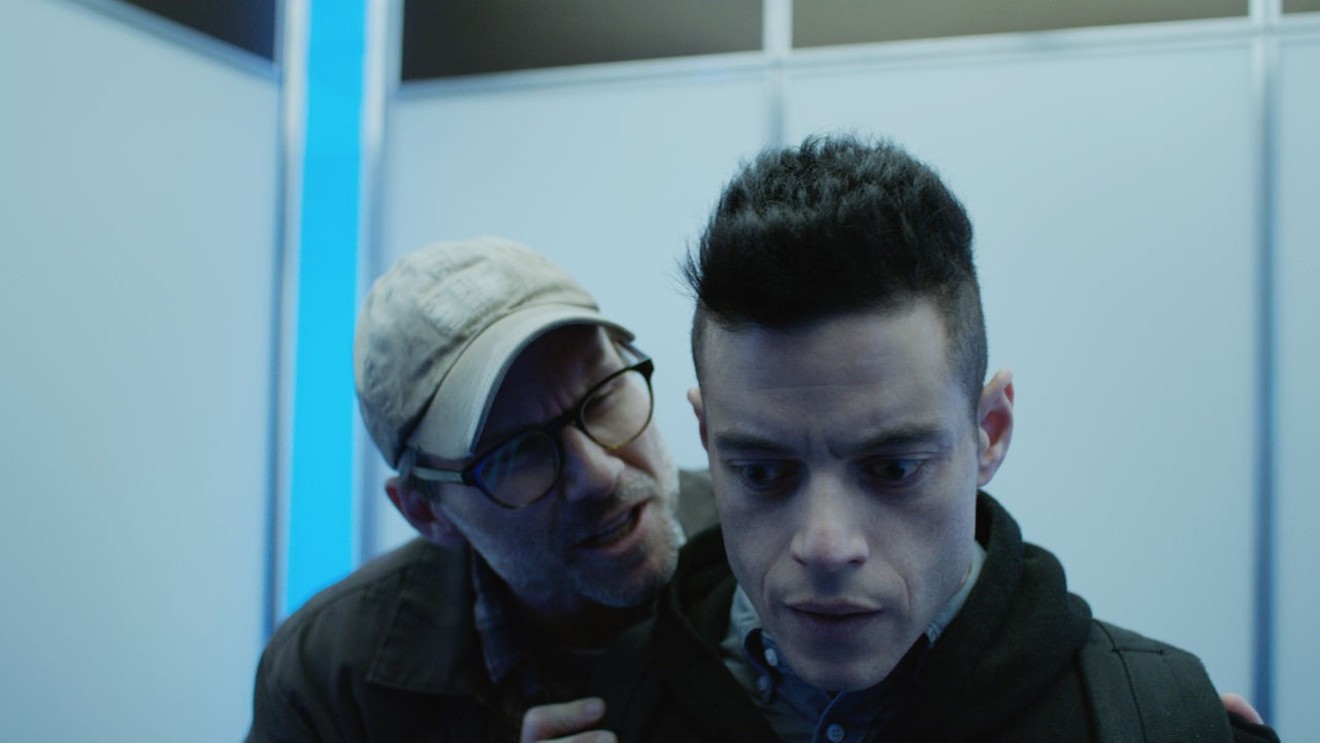Mr. Robot airs on the USA Network
The pilot of Mr. Robot opens on a gaggle of powerful executives, filmed in shadowy silhouette in a boardroom high up in the sky. The hacker drama’s gut appeal, in the beginning, was a middle finger raised to the men in $10,000 suits who control our world, and the tempting thought of a little nobody with the power to bring them all down with the click of a mouse. Created by the filmmaker Sam Esmail, Mr. Robot premiered in the summer of 2015 on the USA Network a week after we’d laughed off the news that Donald Trump was running for president. Like the hypnotic pull of a Wikipedia rabbit hole, Mr. Robot seduced viewers with its darkly funny critique of life under the cloud of late capitalism. Then there’s star Rami Malek’s depiction of the brilliant, bipolar engineer Elliot Alderson, whose Xanax-flattened voiceovers speak directly — accusingly — to you, watching the show. “I'm not ready to trust you yet,” he warns.
That first episode has a killer hook, setting up a story of vigilante justice: A coffee-shop owner with a predilection for kiddie porn is busted when Elliot, a disaffected twenty-something in a black hoodie who suffers from chronic depression and anxiety, hacks him and tips off the cops. At the series’ start, Elliot works at a cybersecurity firm alongside his childhood best friend, Angela Moss (Portia Doubleday), unaware that he has an aggressive alter ego, a totally separate personality called Mr. Robot, physically manifested by Christian Slater. The name is a nod to the computer repair shop his dad owned before he died when Elliot was a child, the result of a gas leak at E Corp, the global conglomerate where both Elliot’s dad and Angela’s mom — who also died — worked. In the first season finale, with the help of the hacker group fsociety, Elliot and his sister Darlene (Carly Chaikin) trigger a global economic meltdown, wiping away the world’s debt.
“Yeah,” Elliot says in voiceover this season. “This is fucking confusing.”
From the outset, Mr. Robot felt somewhat alien: the off-kilter camera angles; the foreign, clipped mix of Swedish and Danish spoken between E Corp exec Tyrell Wellick (Martin Wallstrom) and his wife Joanna (Stephanie Corneliussen) — a pregnant hottie in bondage gear, spurring on her ambitious husband like a kinky Lady Macbeth. The plot may be frustratingly thorny, but the eerie glow of the show’s vision of Manhattan at night is usually enough for me. It’s delicious to curl up with Mr. Robot late at night and give yourself over to the show’s pervasive paranoia, the mindfuck of it all. I guess this is how I’d prefer to experience the tumult of revolution — through the TV, sitting on my couch.
The scope of the Mr. Robot’s conspiratorial scheme widened as the show went on. There’s the E Corp CEO, Phillip Price, plotting world domination (Michael Cristofer); a Chinese minister moonlighting as a transgender woman — and the leader of a sinister hacking group called the Dark Army (BD Wong); a lollipop-sucking FBI agent (Grace Gummer) who offers immunity to Darlene in exchange for information on Elliot.
Despite, or probably because of, the density of its plot, Mr. Robot is almost more enjoyable if you don’t really know what’s going on. I’ve learned to let the techno jargon wash over me like the final stream-of-consciousness pages of Ulysses. Sometimes it’s easier, and more enjoyable, to surrender to Mr. Robot’s sensory pleasures. Esmail, who initially conceived of the show as a feature film, viscerally captures the sense of unease that can consume even the most mentally sound New Yorker. Moody gray skies glimpsed through the glass windows of Midtown high-rises contrast with the smoky, neon-lit interiors where hackers gather to plot their righteous mischief. Ironic music cues — like a scene in the Season 3 premiere in which a depressed Elliot cycles through daily life as a corporate drone to the upbeat sounds of INXS’ “New Sensation” — abound, and frequently stop, abruptly, as if someone’s just yanked out your earbuds while you’re walking on a busy street.
The show wears its iconoclasm on its sleeve. “I understand what it's like to be different,” Elliot tells us in voiceover in the pilot episode. But, if you set aside its distinct aesthetic and its maddening density — “difficulty” suggests a level of narrative dexterity I don’t think is warranted — Mr. Robot is not so unconventional after all. Of course, Elliot, Angela and Angela’s doofus boyfriend (he disappears after the first season) all work in the same office. Of course, isolated and antisocial as he is, Elliot fucks a hot chick in the first 20 minutes of the pilot and, of course, we see her bare ass. Of course, that hot chick — Shayla (Frankie Shaw), Elliot’s neighbor and dealer — ends up a dead body stuffed in the trunk of a car before the first season’s up. I can’t remember the last time her name came up.
Three seasons in, there sure are a lot of beautiful dead women decorating the set of Mr. Robot. Shayla wasn’t the first; in the previous episode, in the first season, Tyrell strangles a woman — the wife of an E Corp colleague who was promoted over Tyrell — after making her believe he wants to sleep with her. In Season 2, Darlene kills E Corp’s general counsel after she and fsociety take over the woman’s fancy “smart house” to use as their base.
Most recently, we’ve seen Joanna shot in the head by an angry ex-lover while her newborn baby wails beside her. Esmail — who directed just three of the first season’s 10 episodes but helmed every episode of Seasons 2 and 3 — begins the next scene with a close-up shot of Joanna’s skull being cracked open at a forensic lab, her long, dark hair spilling over her pale face; she’s a bloody rag doll in the blurry background of a conversation between two FBI agents. Maybe it’s an appropriate send-off for a character whose motivations throughout the series remained entirely hazy, and who was brutally beaten in the second season, leaving her face mottled with angry purple bruises. I supposed we’re meant to enjoy the irony that she loved torture play.
That’s the problem with Mr. Robot: It feels revolutionary until you stop and think about it. “Fuck society,” Elliot intones 12 minutes into the pilot, launching into a monologue explaining exactly why we should fuck society — “Our choices were premade for us a long time ago.” And it’s pretty convincing until the camera zeroes in on a copy of The Hunger Games sticking out of the purse of Elliot’s sympathetic psychiatrist Krista (Gloria Reuben). Elliot will soon humiliate Krista, for the viewer’s benefit, by hacking her and revealing that she’s a lonely divorcee with a predilection for anal porn and is unwittingly dating a married man; she’s the basic bitch reading The Hunger Games on her lunch break. “We want to be sedated,” Elliot insists in voiceover as the camera flashes to the book, as if to suggest that The Hunger Games is society’s bullshit but Mr. Robot is the truth.
In the eyes of Mr. Robot, we’re all helpless puppets. We can only hope against hope that the brilliant man at the center of the show can get his shit together in time to save the world. This isn’t a show about underdogs; the story it wants to tell doesn’t have much room for the less than exceptional. It’s not that I don't enjoy Mr. Robot. But I’m not ready to trust it yet.
[
{
"name": "Air - MediumRectangle - Inline Content - Mobile Display Size",
"component": "18478561",
"insertPoint": "2",
"requiredCountToDisplay": "2"
},{
"name": "Editor Picks",
"component": "16759093",
"insertPoint": "4",
"requiredCountToDisplay": "1"
},{
"name": "Inline Links",
"component": "17980324",
"insertPoint": "8th",
"startingPoint": 8,
"requiredCountToDisplay": "7",
"maxInsertions": 25
},{
"name": "Air - MediumRectangle - Combo - Inline Content",
"component": "16759092",
"insertPoint": "8th",
"startingPoint": 8,
"requiredCountToDisplay": "7",
"maxInsertions": 25
},{
"name": "Inline Links",
"component": "17980324",
"insertPoint": "8th",
"startingPoint": 12,
"requiredCountToDisplay": "11",
"maxInsertions": 24
},{
"name": "Air - Leaderboard Tower - Combo - Inline Content",
"component": "16759094",
"insertPoint": "8th",
"startingPoint": 12,
"requiredCountToDisplay": "11",
"maxInsertions": 24
}
]











